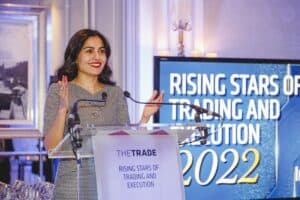 In the current market environment is there any room for anything other than a high touch service?
In the current market environment is there any room for anything other than a high touch service?
It’s usually true that during times of high volatility the marketplace tends to pivot toward more high-touch and care trading services. The ability to lever the instincts and experience of deeply connected trading desk teams is welcome in unpredictable markets. However, when liquidity is scarce clients move back to anonymity and trading electronically. That can still require high-touch service as the boundaries of high and low touch services have morphed across channels.
Over the years, we’ve continued to see a move further toward electronic. This trend may be the result of an increasingly quantitative focus coming from the buy-side. We see greater use of auto routing, algo wheels and more sophisticated use of all forms of analytics, not just at parent level. This means that EMS and the analytics that accompany them are must-haves and are driving greater and greater proportions of flow toward electronic trading. The uptake of conditional order management tools, as well, have enabled traders to reduce opportunity cost on blocks as they work their orders.
What thing or trend is driving the most evolution in electronic trading currently?
Dealing with fragmentation, multiple venues, regulation, and capturing alternative liquidity, for example, retail, all require continuous evolution and utilise the latest techniques.
Execution algorithms now incorporate machine learning based price and volume signals that are derived from a broad spectrum of inputs. In addition, algorithms are more impact-aware while executing the orders in real-time and are able to dynamically re-optimise the schedule based on both price/volume signals and realised impact. Our real-time optimiser, “Micro Adaptive Sequencer”, is an example which incorporates neural-network based signals, real-time propagation-based impact model along with expected client alpha or momentum, to dynamically optimise the schedule in real-time. These developments have increased confidence in electronic trading in such difficult times with elevated volatility and depressed liquidity.
And of course, I haven’t even touched upon the Close, but it continues to dominate and take focus, so looking at smarter ways to trade at the close; looking at liquidity opportunities versus benchmarking, et cetera.
How is the role of the sales trader evolving?
Sales traders are critical in all execution channels and fair to say that the service provided has been aided by technology innovations. The increased sophistication in tools and information they have to hand is incredible and incomparable to say when I started the industry!
In our view, the role of a sales trader involves working extensively with our clients to understand their objectives, their trading styles, and go beyond just execution of their instructions – to actually deliver added value by way of sharing our intimate understanding of how the strategies, tools and infrastructure work. However, they also need to anticipate what clients might need beyond their explicit asks at any given moment. Sales traders are meant to be an extension of our clients’ trading desks – to translate the opportunities inherent in our offerings to their needs, anticipate things they may need but have not yet articulated, and to proactively consult in a way that enhances their workflow and ultimately, their performance.
Finding the optimal balance in interaction and level of service that the client is looking for is a key skill.
Changing gears: You and your firm participated again recently in the Rising Stars of Trading and Execution Awards. Why is that event important to Instinet, and to you, personally?
We love the Rising Stars, and look forward to sponsoring it each year. From Instinet’s perspective, it’s important to us to remain mindful that the great innovations and positive change we will see in the future are going to be created by the emerging young talent of today.
On a personal note, the Rising Stars event is one my favourite awards of the year. As a manager I have seen first-hand the positive impact it has on individual’s motivation and careers by showing recognition at an early stage; it gives them confidence and encouragement that they are on the right path. It is credit to our financial services industry that we are still attracting talent despite competition from other sectors. We just need to ensure we continue to nurture and retain.
It was a pleasure to meet this year’s diverse and talented group of professionals and it’s wonderful to see, so many people including their bosses and previous alumni come and support the on the evening. And of course, it would be remiss of me if I didn’t say that The TRADE know how to throw a party – the event was fabulous. So, thanks for that!